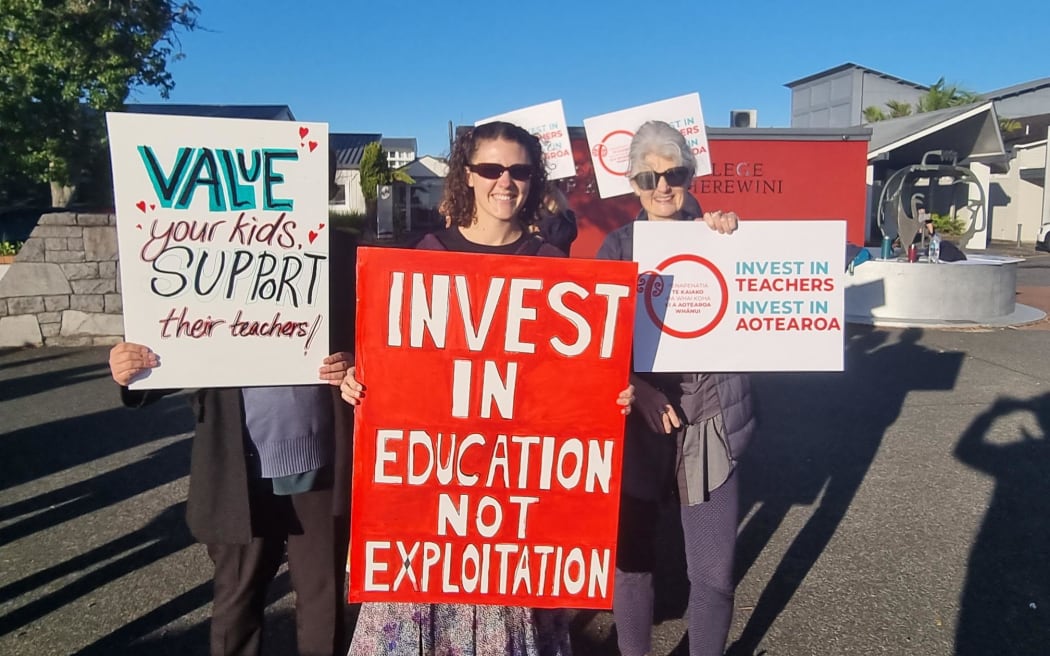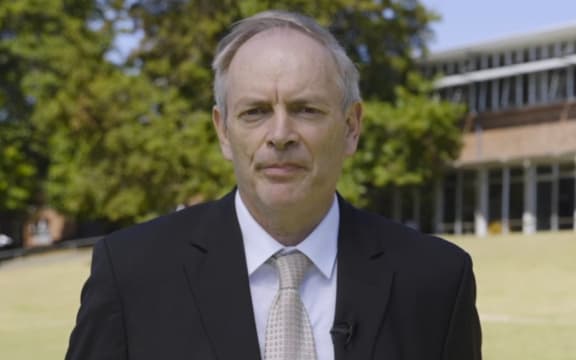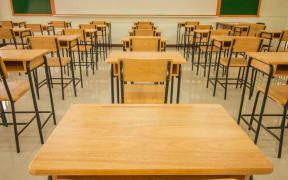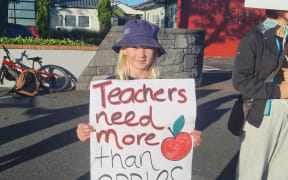
Striking secondary school teachers picketing outside Selwyn College in Auckland. Photo: RNZ / Jonty Dine
Secondary school teachers look set to continue rolling strikes for better pay, after three days of bargaining last week between the Post Primary Teachers' Union (PPTA) and the Ministry of Education failed to reach a settlement.
The Employment Relations Authority (ERA) has stepped in, recommending the PPTA and the ministry consider independent arbitration.
It also asked teachers to stop industrial action in the meantime, but the PPTA said strikes would keep going while they looked at the recommendations.
A group of Wellington students has started an Instagram page called 'We Back our Kaiako' to throw their support behind the teachers. They will be leading a protest at Parliament on Wednesday afternoon, demanding "fair pay, better class sizes and workload for teachers", as well as ending job and subject cuts at Victoria University of Wellington.
"Walking into school, you can tell when the teachers are overworked, you can tell when they're stressed," organiser Kay, a Year 13 student at Aotea College, told RNZ's First Up on Monday.
"It means that they're not able to teach the way that works best for all students. They don't have that time to be able to work one-on-one with those who need it."
The PPTA rejected the latest pay offer from the ministry, which included a lump sum payment and three pay rises by the end of next year. There was no word yet on Monday morning whether they would accept the ERA's recommendations.
Kay said her favourite teacher quit at the end of last year "because she wasn't getting good enough treatment from the government".
"It was very sad. She was an amazing teacher. She would have such great contributions."
Kay said while the disruption likely would not stop anyone from passing their subjects, it would make it harder to get high marks, with teachers having to "cram" all their teaching into fewer lessons.
"Everything's only being taught just to scrape by. There's not the opportunity to extend yourself and get the higher grades anymore."
While New Zealand universities might take this into account when looking at prospective students' grades, international universities would not, Kay said.
"If they want to apply for an international university, it's not going to be an option. The grades will not be able to be at the height needed."
Kay was not sure what kind of turnout to expect on Wednesday, because some students might not want to take even more time out of class.
"Everyone seems to be on the teachers' side because the thing is, it's our learning that's being affected by this all. It's not just about the days off, it's about securing our future - and our future does rely on teachers getting the outcome they need."
This week, Year 9 and 10 students will not be taught on Monday; Year 11 and 12 students will have Tuesday off; on Wednesday, Year 9 gets another day off, as do Year 13; and on Thursday, Year 10 and 11 both get another day at home. Only on Friday will all students be taught as usual.
In a statement late last week, the Ministry of Education said the strikes "put young people in the middle of an adult dispute".
'Redouble their efforts'
Sacred Heart College in Auckland principal Patrick Walsh told RNZ's Morning Report it was disappointing last week's bargaining ended without any kind of resolution.
"Teachers, parents and students are frustrated and fed up with the ongoing industrial action. We have senior students that have just come out of three years of Covid, many of them have learning deficits and they cannot afford more time out of the classroom.

Patrick Walsh, principal of Sacred Heart College in Auckland. Photo: Sacred Heart College / Supplied
"We're starting to lose academic momentum at a crucial time of the year and we've also just getting on top of the truancy issues. So this is certainly not helping.
"It's accepted that, you know, teachers are underpaid. We do have major recruitment and issues in teaching, but we do think the PPTA and the ministry need to redouble their efforts and sort this one out."
He called on some "loosening" on both sides so students could get back into the classroom.
"If this carries on, there will be long-term effects on students."
But the onus was mostly on the government to "stump up a little bit more money to ensure teachers or teaching is seen as a viable option for young people to enter into the teaching profession".
"The reality for us on the ground in terms of teaching is that we know that the numbers entering teaching are reducing. We're finding it difficult to recruit teachers in key areas such as science and technology."






